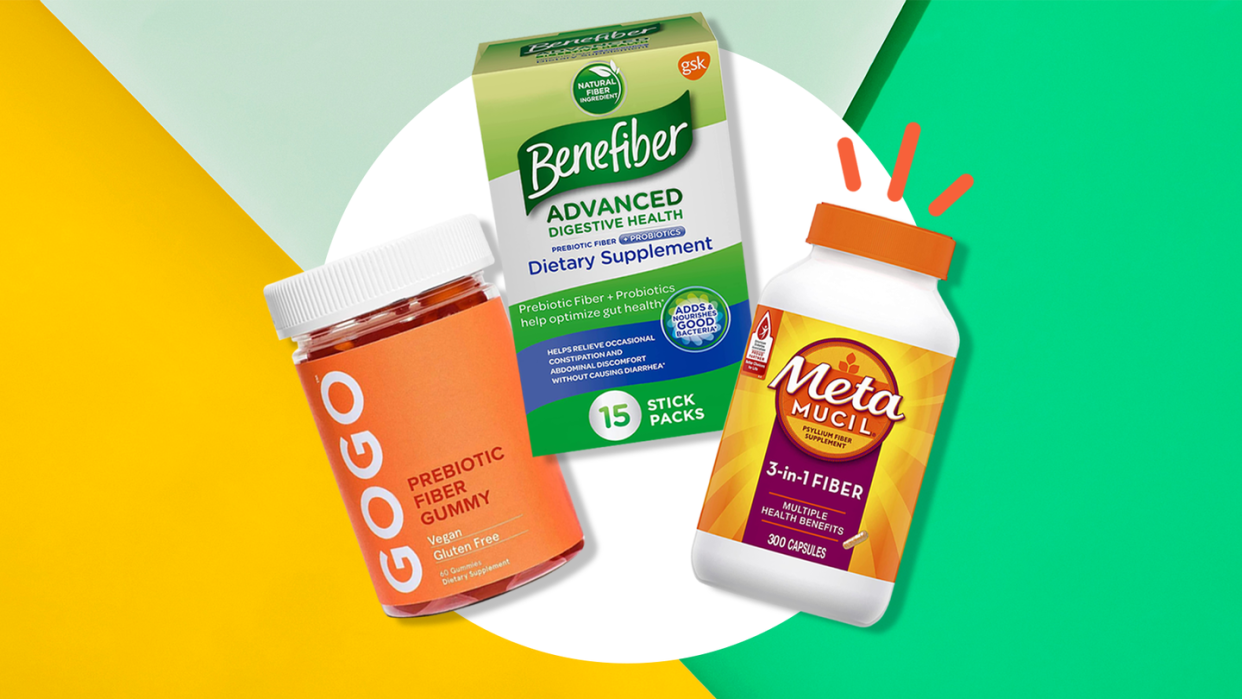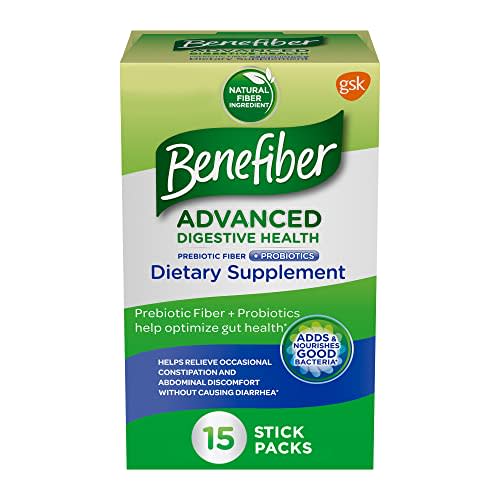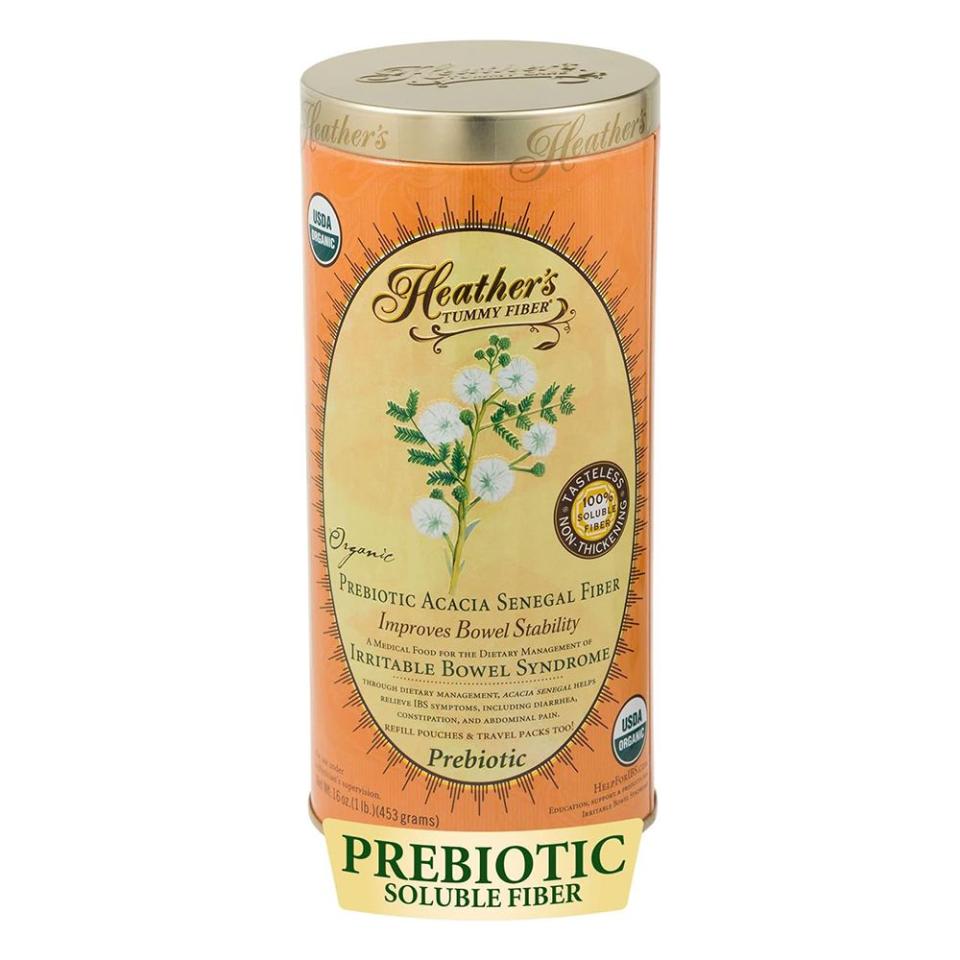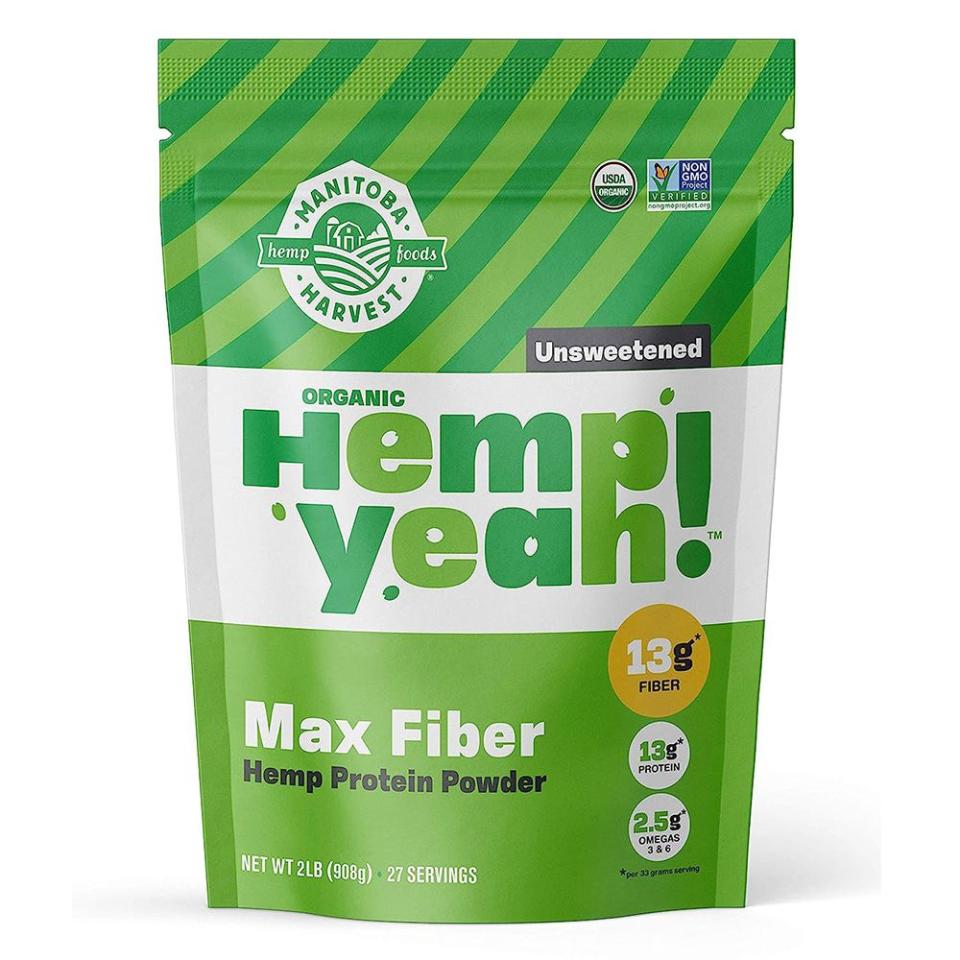Look For A Supplement That Has Soluble *And* Insoluble Fiber If You Have Constipation

"Hearst Magazines and Yahoo may earn commission or revenue on some items through these links."
You probably already know that fiber can work wonders on your digestive system. A quick refresher: Fiber is a type of carb that your body cannot break down. It supports gut health by promoting regularity and relieving GI issues such as constipation.
Fiber is naturally found in foods like fruits, legumes, vegetables, and whole grains. And eating a variety of these foods can help you meet your daily fiber goal, says May Zhu, RD, the founder of Nutrition Happens, which is around 25 grams for women per day.
Getting enough fiber from foods is always the goal, but not everyone can do this easily.
If you have tried to up your fiber intake and still need help, here are 10 fiber powder, capsules, and gummies recommended by registered dietitians, to consider. Remember: Always consult with your doctor before trying new supplements.
Meet the experts: May Zhu, RD, is the founder of Nutrition Happens.
Scott Keatley, RD, is the co-owner of Keatley Medical Nutrition Therapy.
Jessica Cording, RD, is the author of The Little Book of Game-Changers.
Amy Gorin, RDN, is an inclusive plant-based dietitian and the owner of Master the Media in Stamford, Connecticut.
The Benefits Of Getting Enough Fiber
“Fiber plays a crucial role in digestion, helping to bulk up and move stools through the digestive tract,” says Scott Keatley, RD, co-owner of Keatley Medical Nutrition Therapy. “It also helps regulate blood sugar levels, can lower cholesterol levels, and promotes a healthy gut microbiome.”
Having enough fiber can also help you to feel full “potentially assisting with weight management,” Keatley says. A high fiber diet has even been linked with a lower risk of being diagnosed with breast cancer, he points out. And, studies have also associated a high fiber intake with a lower risk of type 2 diabetes.
What are fiber supplements?
There are two main types of fiber: insoluble and soluble fiber. Insoluble fiber does not dissolve in water and helps create bulk in the stool, while soluble fiber dissolves in liquids and helps create a gel-like consistency that promotes stool regularity. “To optimize digestion, ideally, we need a mixture of both in our diets,” explains Zhu. “Most supplements will be broken down into mainly these two categories and may contain both in one product, but you might also find fiber supplements on the market these days that include prebiotic fiber, which is a type that helps feed the good gut bacteria in our digestive tract to promote healthy digestion.”
A prebiotic fiber supp combined with a live probiotic strain is a good choice for people looking to add a fiber supplement to support their general health. But Keatley says these are slightly different from “regular” fiber supplements. “While all prebiotics are fibers, not all fibers are prebiotics,” he explains. “Prebiotic fibers specifically feed beneficial bacteria in your gut, whereas ‘regular’ fiber supplements may just be providing bulk and aiding in digestion without necessarily having the prebiotic effect.”
Those who are dealing with constipation will benefit from a product that contains insoluble fiber, which adds bulk to the stool, and soluble fiber to speed up the elimination process. “But if you are adding a supplement for diarrhea, then you will want something that only contains soluble fiber to help absorb excess water from the stomach and intestines,” Zhu says.
There are a few active ingredients you’ll usually spot in fiber supplements, including psyllium husk, inulin, methylcellulose, and wheat dextrin,” Keatley says.
Who needs a fiber supplement?
If you are eating a variety of fiber-rich foods on a weekly basis, you may not need a supplement. The same goes for people who are regular and don’t have constant bloating or constipation. And remember: It is always best to get fiber from food sources first since they also contain essential vitamins and minerals that a supplement cannot provide.
“I really like taking a food-first approach,” says Jessica Cording, RD, author of The Little Book of Game-Changers. “But if you have a hard time meeting your fiber needs through your day-to-day diet or you find that your fiber needs are increasing, you may want to consider a supplement.” (Again, your doc can advise you here!)
Cording says that people who are taking iron supplements may also benefit from a fiber supplement. “Iron supplements increase the risk of constipation, and a fiber supplement can be useful in alleviating that,” she explains.
How To Choose The Right Fiber Supplement For You
“Fiber is treated as a dietary supplement and not a drug,” Keatley points out. Meaning, it’s not regulated as tightly as medications are. “Therefore, it's important to select a brand that you trust is using quality ingredients that will help you to meet your goals,” he says.
Cording suggests opting for a supplement with a shorter ingredients list. “The less complicated, the better,” she says. She also recommends steering clear of products with added sugar, if possible.
9 Fiber Supplements To Consider
Below, we pulled together a list of nine fiber supplements, each with pros and cons based on expert insight or product reviews.
Advanced Digestive Health Prebiotic Fiber Supplement Powder With Probiotics
Need a fiber supp you can take with you on the go? Try this one. You can mix it into drinks or food easily. "It gets its fiber from guar gum and also contains a boost of gut-friendly probiotics,” says Amy Gorin, RDN, an inclusive plant-based dietitian and the owner of Master the Media in Stamford, Connecticut.

Advanced Digestive Health Prebiotic Fiber Supplement Powder With Probiotics
amazon.com
$5.00
Dr. Formulated Organic Fiber Supplement Powder
This formula is made with five main ingredients from whole food sources and provides five grams of prebiotic fiber per serving. In addition, it is free from added sugars and suitable for a variety of different lifestyles, notes Zhu.

Dr. Formulated Organic Fiber Supplement Powder
amazon.com
$15.94
Fiber Gummies For Adults
If you love gummies, you'll be a fan of these delicious, fiber-packed chewables. “These are orange sorbet-flavored and get their fiber from chicory root providing three grams of fiber per two gummies,” says Gorin.

Fiber Gummies For Adults
amazon.com
$29.99
Fiber Organic Acacia Senegal for IBS
If you have IBS, Gorin says this may be a good option for you. “The prebiotic fiber may help relieve constipation and diarrhea associated with IBS,” she says. But be sure to talk to your primary care physician to determine whether this fiber supplement is right for you and works with your current treatment plan.

Fiber Organic Acacia Senegal for IBS
amazon.com
$19.97
Hemp Yeah! Organic Max Fiber Protein Powder
This fiber supplement provides a protein boost as well. “I love that this only contains hemp powder, and you get 13 grams of both fiber and protein in one serving," says Zhu. "Plus, you get the added benefits of omega-3 fatty acids from hemp seeds." It also has no added sugars or gluten.

Hemp Yeah! Organic Max Fiber Protein Powder
amazon.com
$25.16
3-in-1 Fiber
These sugar-free Metamucil capsules contain plant-based psyllium husk and may be a more convenient way to take fiber compared to the powder form, says Zhu.

3-in-1 Fiber
amazon.com
$29.42
Psyllium Husk Powder
This single-ingredient fiber supplement contains both soluble and insoluble fiber. “This can work to relieve both constipation by increasing stool bulk and diarrhea by helping to absorb water and slow down stool passage in the colon,” says Zhu.

Psyllium Husk Powder
amazon.com
$16.80
Sugar-Free Gummies With Vitamin D3
“In addition to featuring the most clinically researched Bacillus probiotic strain, this gummy supplement is naturally sweetened with fructooligosaccharides, which add nearly four grams of prebiotic fiber per serving,” says Mia Syn, RD, the founder of Nutrition by Mia.
Prebiotic fiber works synergistically with probiotics to improve digestive health. Additionally, it provides vitamin D3, a nutrient that many Americans fall short on, notes Syn.

Sugar-Free Gummies With Vitamin D3
amazon.com
$15.70
Gut Guru Prebiotics and Probiotics Gummies
This gummy supplement provides three grams of dietary fiber per serving from inulin, which is a prebiotic fiber that helps selectively nourish the good bacteria in the gut to support digestion as well as immune health, per Syn. It also contains probiotics to potentially add additional good bacteria to your body, she explains.

Gut Guru Prebiotics and Probiotics Gummies
amazon.com
$20.99
How We Chose The Best Fiber Supplements
For the past year, Women’s Health editors and writers, including Ashley Martens and Korin Miller, vetted the bestselling, most popular, and top-rated fiber supplements. Our team consulted four registered dietitians, and then evaluated customer reviews and ratings to narrow down the best nine items for a wide range of needs and preferences.

Is it safe to take a fiber supplement daily?
You can, in theory, take them every day, but should really save them for when you are unable to meet daily fiber requirements through food alone, says Zhu.

When is the best time to take your fiber supplement?
Keatley recommends that you take a fiber supplement “in between meals and away from when taking oral medications.” Why? “Jamming a ton of fiber into your system all at once is not an ideal way for the body to handle it,” he says. “So, try to spread it out with about 10 to 15 grams from meals and the rest coming from snacks or supplements.”

What fiber supplement dose should I start with?
A lot depends on you and your individual needs, but Cording recommends starting slow. “If you step up your fiber intake too quickly, it can cause bloating, discomfort, and gas, especially if you’re not drinking enough water,” she says. “Step it up gradually.”

You Might Also Like

